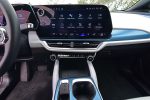
GM Clamps Down on Apple CarPlay Retrofits in EVs
General Motors is drawing a firm line in the sand when it comes to Apple CarPlay in its latest electric vehicles, and it’s not just about skipping the feature in new models — the automaker is now actively shutting down aftermarket efforts to bring it back.
Back in November, White Automotive & Media Services rolled out one of the first and only viable Apple CarPlay and Android Auto retrofit kits for GM’s new Ultium-based EVs. This solution offered a factory-style experience, complete with wired and wireless connections and full-screen integration, but due to its complexity, installation was limited to just one dealership: LaFontaine Chevrolet in Plymouth, Michigan.
Despite being a promising workaround for tech-savvy customers unwilling to give up CarPlay, the retrofit has been abruptly discontinued. While White Automotive initially offered a vague explanation citing long-term viability concerns, recent reports from The Drive and GM Authority reveal that General Motors applied pressure behind the scenes. According to those sources, GM directed LaFontaine Chevrolet to cease offering the retrofit, citing potential interference with “critical safety features” and warning that it could void parts of the vehicle’s warranty.
This latest move reaffirms GM’s firm stance against Apple CarPlay in its EV lineup — a decision that drew widespread criticism when the company first announced it in 2023. Instead, GM is doubling down on its proprietary infotainment software, co-developed with Google. While the automaker argues this approach allows for deeper integration with vehicle systems, better OTA (over-the-air) updates, and improved safety monitoring, many customers are frustrated by the lack of choice, especially given the popularity and seamless functionality of Apple CarPlay and Android Auto.
By actively working to prevent even third-party solutions, GM is entering controversial territory, risking the perception that it’s prioritizing control over consumer preference. The company maintains that its decision is rooted in safety and warranty integrity, but critics argue it’s more about maintaining ecosystem dominance and capturing in-car data and monetization opportunities.
As of now, it’s uncertain how GM plans to handle EV owners who already had the retrofit installed. A future software update could disable the system altogether, which raises additional concerns about long-term product compatibility and consumer rights.
This situation shines a spotlight on a growing tension in the auto industry — one where automakers are shifting from traditional manufacturers to software gatekeepers. Tesla famously doesn’t support Apple CarPlay either, and now it seems GM is following that blueprint more aggressively than most legacy automakers.
For consumers, this raises a pressing question: Should they accept automaker-curated software experiences, or demand the freedom to choose tech that best suits their lives? In a world where smartphones have become deeply embedded into our routines, the ability to mirror that experience in the car isn’t just a luxury — it’s an expectation.
We’ll be watching closely to see if any other aftermarket companies dare to challenge GM’s restrictions or if the automaker continues tightening the screws on third-party innovation.


